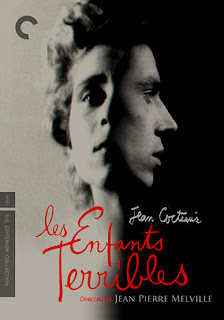Les Enfants Terribles
Jean-Pierre Melville's second film was Les Enfants Terribles, released in 1950, which was based on a novel by Jean Cocteau. The novel was published in 1929, and for many years Cocteau refused to allow it to be made into a film. He was impressed, though, with Melville's first film, La Silence de Mer, and allowed Melville to make it. But Cocteau kind of hung around the set, and the actors deferred to him, which made Melville mad.
It is a Melville film, though, with lots of interesting angles and noir touches, even before he started making noir films. In essence, the film is a black comedy (I thought a lot of it was funny) about two siblings who can't quit each other.
Elisabeth and Paul live with their invalid mother, who Elisabeth takes care of. Paul is at school, and has a boy-crush on a notorious miscreant. That boy, in a snowball fight, hits Paul in the chest, who collapses. The doctor says he has a weak heart and needs to rest. Then the mother dies, and the two young adults hardly ever leave the house. They are joined frequently by their friend Gerard.
Eventually Elisabeth gets a job as a model (the old-fashioned kind, who works in a dress shop) and meets a friend, whom she invites to live with them. Paul and this new girl, Agathe, have an instant love/hate reaction (she looks just like Paul's crush). Then Elisabeth marries a rich guy who up and dies, and leaves her a huge mansion, where the four of them play house and Elisabeth goes to great lengths to make sure Paul stays with her always.
The film is buoyed by the ebullient performance of Nicole Stephane as Elisabeth. She enjoys playing the martyr, and she and Paul are always fighting about something, but also playing secret games. Their relationship is not incestuous, but profoundly disturbing. Paul is played by Edouard Dermit, who has a lot of energy but little subtlety. Jacques Bernard is much better as Gerard, who somehow finds sustenance from these two weirdos.
The film has a claustrophobic feel, especially during those scenes in which Paul and Elisabeth are in the same small bedroom. When the film moves to the mansion, it still feels that way, because despite the 18 rooms the four seem to gravitate to the same room. Melville frequently shoots from the floor or from the ceiling, rarely from eye level, so we never feel comfortable with these characters.
I liked the film, which is narrated by Cocteau, but the whole thing seems unsure of itself. The ending is also very melodramatic and doesn't seem entirely authentic, although Elisabeth's actions are always unpredictable.
It is a Melville film, though, with lots of interesting angles and noir touches, even before he started making noir films. In essence, the film is a black comedy (I thought a lot of it was funny) about two siblings who can't quit each other.
Elisabeth and Paul live with their invalid mother, who Elisabeth takes care of. Paul is at school, and has a boy-crush on a notorious miscreant. That boy, in a snowball fight, hits Paul in the chest, who collapses. The doctor says he has a weak heart and needs to rest. Then the mother dies, and the two young adults hardly ever leave the house. They are joined frequently by their friend Gerard.
Eventually Elisabeth gets a job as a model (the old-fashioned kind, who works in a dress shop) and meets a friend, whom she invites to live with them. Paul and this new girl, Agathe, have an instant love/hate reaction (she looks just like Paul's crush). Then Elisabeth marries a rich guy who up and dies, and leaves her a huge mansion, where the four of them play house and Elisabeth goes to great lengths to make sure Paul stays with her always.
The film is buoyed by the ebullient performance of Nicole Stephane as Elisabeth. She enjoys playing the martyr, and she and Paul are always fighting about something, but also playing secret games. Their relationship is not incestuous, but profoundly disturbing. Paul is played by Edouard Dermit, who has a lot of energy but little subtlety. Jacques Bernard is much better as Gerard, who somehow finds sustenance from these two weirdos.
The film has a claustrophobic feel, especially during those scenes in which Paul and Elisabeth are in the same small bedroom. When the film moves to the mansion, it still feels that way, because despite the 18 rooms the four seem to gravitate to the same room. Melville frequently shoots from the floor or from the ceiling, rarely from eye level, so we never feel comfortable with these characters.
I liked the film, which is narrated by Cocteau, but the whole thing seems unsure of itself. The ending is also very melodramatic and doesn't seem entirely authentic, although Elisabeth's actions are always unpredictable.



Comments
Post a Comment